|
Dog Acid Reflux:
Is There A Natural Antacid For Dogs?

How can you tell if your dog is suffering from acid reflux? Acid reflux in dogs is a common yet painful condition that can be surprisingly subtle, even to the most attentive pet owners. Watch for signs like vomiting bile or unusual behaviors such as excessive grass eating, licking the floor, or gulping at night - these can indicate your dog is trying to ease the discomfort of acid reflux or GERD (gastroesophageal reflux disease). Dog acid reflux occurs when stomach acids flow back into the esophagus, causing irritation and pain. If your dog struggling with acid reflux, especially at night, finding the right treatment is essential for their comfort.
A natural approach can provide quick relief and help your dog feel better. By improving digestion through dietary changes, using natural digestive supplements, and making lifestyle adjustments, you can soothe your dog's uncomfortable reflux symptoms. Ask Ariel has been helping dogs with acid reflux since 2005, and our supplements and diet tips can make a real difference for your dog.
Acid Reflux In Dogs: Symptoms To Watch For
Acid reflux and GERD in dogs can be very uncomfortable and painful. Common dog acid reflux symptoms include:
Regurgitation - Dogs might casually spit up or regurgitate small amounts of food, especially when moving up or down stairs, getting up or down, walking, or even when being picked up. This occurs when food isn’t fully swallowed. Unlike vomiting, regurgitation is usually passive, with food coming up without the abdominal effort seen with vomiting.
Vomiting - Dogs with acid reflux may vomit bile (a yellowish fluid) or undigested food. Vomiting can occur more frequently, especially after meals.

Bad Breath - The regurgitated stomach acid can cause a sour smell, leading to bad breath in affected dogs.
Gulping & Stomach Noises - Dog acid reflux can cause loud stomach noises or gulping, especially at night. Lip smacking or frequent opening and closing of the mouth are often signs that a dog is feeling queasy.
Nausea & Decreased Appetite - Dogs may feel nauseous and show a reluctance to eat, particularly in the morning, due to discomfort from acid reflux.
Panting or Restlessness - Dogs with acid reflux may pant a few hours after eating or seem restless, indicating discomfort.
Excessive Grass Eating - While some grass eating is normal, excessive grazing can be a sign of acid reflux, as dogs may be trying to soothe their stomachs.
Lick Fits (Frantic Licking of Floors, Walls, Grass, Dirt) - Dogs experiencing acid reflux may engage in frantic licking behaviors as a way to alleviate discomfort in their throat or stomach.
What Is The Difference Between Vomiting & Regurgitation In Dogs?
Regurgitation in dogs is when undigested food or water comes up from the esophagus. Dogs may just be walking and soupy food falls out of their mouth. Regurgitation can be a symptom of acid reflux in dogs.
Dogs with acid reflux often have dysbiosis - an imbalance in gut bacteria. This imbalance weakens the lower esophageal sphincter (the muscle separating the esophagus and stomach), allowing stomach contents to flow back into the esophagus. To prevent regurgitation in dogs, it's important to maintain a healthy microbiome through proper nutrition and address dysbiosis.
Vomiting may also be a symptom of acid reflux, but it differs from regurgitation. Regurgitation occurs in the esophagus, typically due to issues with esophageal function. Vomiting involves the stomach and is associated with abdominal contractions and the forceful expulsion of stomach contents. Both regurgitation and vomiting are uncomfortable and painful symptoms associated with dog acid reflux.
Acid Reflux in Dogs: Understanding The Causes
Dogs may experience acid reflux for a variety of reasons. Some common causes of dog acid reflux include:
 Poor Digestion - Inefficient digestion can lead to the buildup of stomach acids, which may reflux into the esophagus.
Poor Digestion - Inefficient digestion can lead to the buildup of stomach acids, which may reflux into the esophagus.
Poor Diet - A diet lacking in proper nutrients or high in fat and difficult-to-digest ingredients can trigger acid reflux.
Food Allergies & Intolerances - Dogs with food allergies or sensitivities to certain foods may experience digestive upset, including acid reflux.
Intestinal Dysbiosis - An imbalance of gut bacteria can disrupt digestion, contributing to acid reflux.
Bowel Disorders - Conditions such as inflammatory bowel disease (IBD) or other gastrointestinal disorders can exacerbate acid reflux by disrupting normal digestive processes.
Diseases - Symptoms of GERD or acid stomach may be due to diseases such as cancer, liver or kidney disease.
Dog Acid Reflux at Night Treatment
Acid reflux in dogs can cause discomfort, irritation, and a burning sensation in the esophagus due to the backflow of stomach acid. This discomfort may lead to symptoms such as regurgitation, vomiting, restlessness and swallowing noises. Here are some reasons why acid reflux in dogs might be more noticeable or problematic at night:
Lying Down: When a dog lies down the stomach contents are more likely to reflux into the esophagus.
Decreased Salivation: Saliva helps neutralize stomach acid and dogs produce less saliva during sleep. Reduced saliva production at night may contribute to increased acidity.
Increased Pressure: In a lying position, there is less gravitational assistance in keeping stomach contents down, allowing acid to move more easily into the esophagus.
Feeding a small, easily digestible snack at bedtime is an easy dog acid reflux at night treatment. An empty stomach may produce more stomach acid, so feeding a small snack ensures that your dog doesn't go to bed on an empty stomach. Some foods may act as natural antacids, helping to buffer stomach acid and reduce the likelihood of reflux. For example, a small amount of raw goat milk for dogs can have a soothing effect.
For more information about grass eating, food allergies and acid stomach, please see the many articles on our website.
Dog Acid Reflux Home Remedies
If you want to have an impact on acid reflux, we recommend using the following trio of supplements:
Antacids help to coat the stomach and soothe the symptoms of acid reflux, GERD, and heartburn.
Probiotics to promote a balanced balanced gut microbiome and strengthen the lower esophageal sphincter.
Digestive Enzymes to enhance digestion and promote proper digestion of fats and protein.
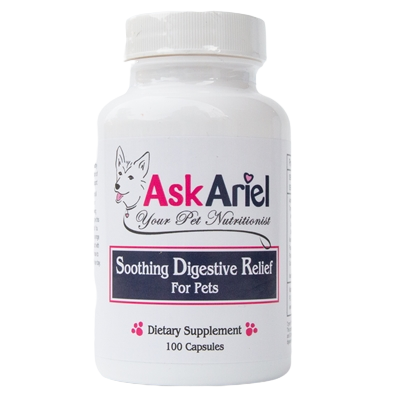
Soothing Digestive Relief
Our natural antacid for dogs. Promotes efficient digestion, reducing the risk of regurgitation and minimizing acid reflux occurrences. Formulated with papaya leaf and marshmallow root for dogs, it helps to calm and soothe the stomach and esophagus. Soothing Digestive Relief is an effective dog acid reflux at night treatment.
Learn more about Soothing Digestive Relief
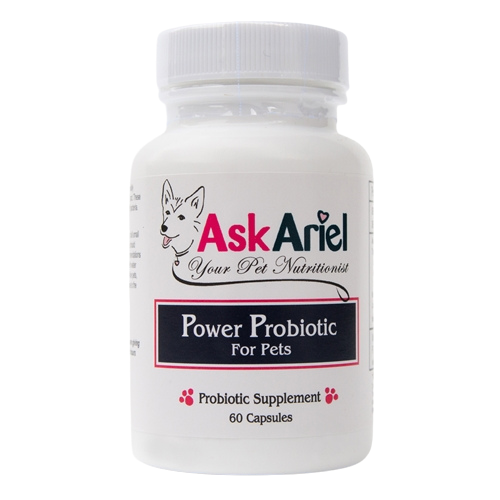
Power Probiotic for Dogs
Promotes a balanced gut microbiome to aid in the digestive process which may help relieve acid reflux symptoms in dogs. Probiotics can potentially strengthen the lower esophageal sphincter, to prevent acid and stomach contents from flowing back into the esophagus.
Learn more about Power Probiotic
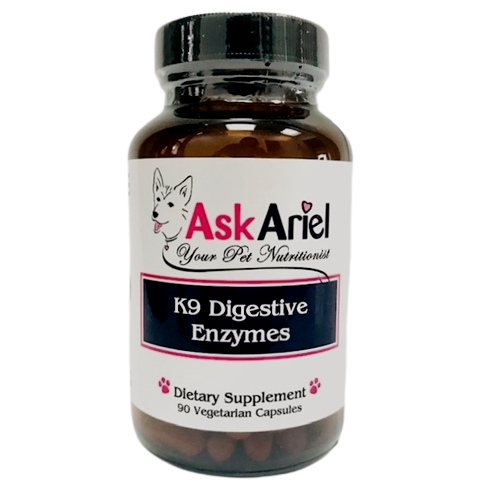
K9 Digestive Enzymes
Digestive aid for dogs featuring a blend of hydrochloric acid (HCL), ox bile and pancreatin. Offers comprehensive support for acid reflux by enhancing the digestive process. Works synergistically to ensure efficient food breakdown, effective fat digestion and optimal nutrient absorption to help minimize acid reflux symptoms. For medium to large dogs.
Learn more about K9 Digestive Enzymes
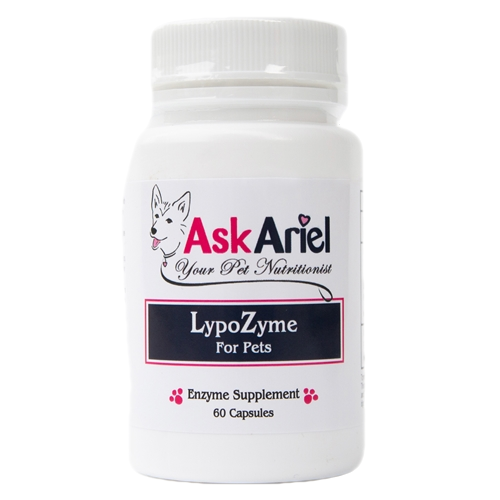
LypoZyme Digestive Enzymes for Dogs
These tasteless, easy-to-administer digestive enzymes work especially well for small or sensitive dogs. This plant-based supplement for dogs can help improve the digestion of fats, protein and carbohydrates. For small and sensitive dogs.
Learn more about LypoZyme
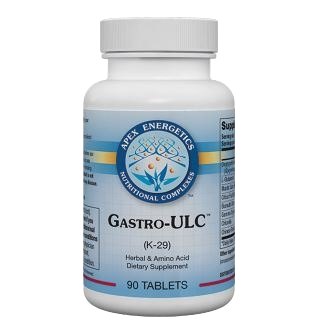
Gastro ULC Acid Reducer
This tried and true stomach acid reducer for dogs helps to soothe and repair the stomach liniing. It includes natural ingredients like DGL, mastic gum and l-glutamine which can help relieve stomach acid pain and discomfort.
Learn more about Gastro ULC
How To Treat Acid Reflux In Dogs Naturally: Success Stories
Buckaroo
"When we got our rescue dog, Roo, he was very underweight and had little interest in eating. He had chronic diarrhea, would gag after drinking and was regurgitating small amounts of food.
We started Roo on Soothing Digestive Relief, Power Probiotic and NOT Drops initially. That helped his diarrhea and tummy gurgling. He also started to show more interest in food, but he continued to regurgitate. We introduced the K9 Digestive Enzymes with HCL and the regurgitation stopped. Roo has gained 7 pounds and is now a normal weight.
We can’t express our gratitude enough about how much these supplements have changed his life." - The Davis Family, California
Dakota
"I want to let you know how great Dakota, our Golden Retriever that we rescued, is doing. When we got him, he had bad ear infections that he had for months, and his skin was so black in the armpit and groin areas that we thought it was ground in dirt. He also had acid reflux and would bring up bile several times a day. It has taken several months, but the blackened skin (from yeast) is almost back to normal thanks to K9 Yeast Defense. I wish we had taken “before” pictures of his skin because the difference is remarkable. And, for his acid reflux, we started using your supplements (Power Probiotic, K9 Digestive Enzymes, Gastro ULC and Soothing Digestive Relief). We used to give him Pepcid, but we have been able to slowly wean him off. I can’t forget to mention using your food recommendations. Thank you so much for your supplements and all your help. Dakota is a much happier dog thanks to you!" - Pat & Tim, Pennsylvania
Max
"My 9 year old Welsh Springer Spaniel mix, Max, didn't have much of an appetite and would frequently vomit. He would often rush out to eat grass and then vomit afterwards. I was worried because he was thin and seemed so uncomfortable. I wanted to find a natural alternative to Pepcid for dogs. I followed the Ask Ariel program and changed his diet while using supplements such as Gastro ULC and Power Probiotic. I really wasn't expecting much because I had made prior changes before that hadn’t worked. Within just a few days, Max improved. He no longer was interested in eating grass and his vomiting stopped. Max is now at a healthy weight and it is so nice to see him so happy to see his meals." - Karen, California
Pretty Boy
"I'm writing to tell you that with the help of your supplements, my dog Pretty Boy just turned 17! About four years ago, Pretty Boy started experiencing a chronic cough. At the time, he was taking supplements from another company. He was diagnosed with heart disease and put on conventional medication. I continued with the supplements previously mentioned but I wasn't satisfied with the quality so I decided to search for another source. That's when I found Ask Ariel. Pretty Boy is taking Power Probiotic, Amazing Omegas, Gastro ULC, LypoZyme, Soothing Digestive Relief (when necessary) Dog Brain Booster, Kidney Health, Renelix, Purrfect Pet COQ10, along with his conventional medications to address his heart condition, kidney disease and chronic pancreatitis. Although this seems like a lot of supplements, the combination (with my holistic vet's approval) works well for him and keeps him full of energy. The supplements are all very high quality and with patience and time, really do work. My favorite is the Gastro ULC. Within a couple of weeks, I was able to wean him off of his twice daily administration of Pepcid for his acid stomach due to kidney disease. His digestive woes have all been diminished with the addition of the LypoZyme and Power Probiotic. Thank you for always taking the time to answer my many emails. My resilient little man means the world to me and I am willing to do whatever it takes to keep him healthy and happy!"
Erin, New York
What To Feed A Dog With Acid Reflux?
Dogs who suffer from acid reflux or GERD frequently see an improvement in symptoms by eating a high moisture, low carbohydrate, hypoallergenic diet. Look for food options containing real meat or fish as a first ingredient. Eliminating common allergens, such as beef, poultry, or grains, can be helpful for many dogs with acid stomach. Chemical ingredients like preservatives, colorings, and additives provide no nutritional value and can also contribute to a dog upset stomach. Please include your dog's diet and treats on the order form at checkout. At Ask Ariel, we include FREE diet tips for dogs with acid reflux with each order.
Can I Give My Dog Milk For Acid Reflux?
Some dogs may be allergic to casein, the protein found in milk. This can result in symptoms like diarrhea, gas, and abdominal discomfort. Small amounts of raw goat milk made for pets contains probiotics that can promote a healthy balance of gut bacteria, which might help with digestion. For dogs that have acid reflux in the morning and are reluctant to eat, raw goat milk may be a safe and soothing option.
Feed Smaller, More Frequent Meals
To alleviate acid reflux in dogs, feeding them multiple small meals throughout the day is recommended. Maintaining a consistent feeding schedule is also helpful. A small snack at bedtime, such as raw freeze-dried food or a small amount of goat milk, is an effective dog acid reflux at night treatment.
Originally published Dec 11, 2023
Updated August 16, 2024
Written by: Susan Davis, Pet Health Nutritionist, CCN
All pet treatment protocols and pet treatment supplements have been reviewed and approved by a veterinarian
Acid Reflux & GERD Frequently Asked Questions (FAQs)
Is there a natural antacid for dogs?
Poor digestion, food allergies and low quality ingredients in pet food contribute to acid reflux. You can help relieve painful acid stomach by using a few natural home remedies along with changing your pet’s diet. Our comprehensive natural antacid treatment for dogs includes a home remedy for acid stomach; along with digestive enzymes, probiotics and free diet tips to improve your pet’s digestion. Ask Ariel’s natural antacid for dogs contains licorice root extract and L-Glutamine to protect the mucous membranes against bacteria, like H.Pylori, and helps to soothe and repair the stomach lining. It also contains mastic gum to relieve inflammation and discomfort.
What can I give my dog for acid reflux?
Dogs with acid reflux show signs such as vomiting bile, excessive grass eating, panting or gulping at night. You may also hear loud, digestive noises coming from your dog’s stomach. Acid reflux in dogs occurs when stomach acid pushes up out of the stomach and into the esophagus, causing pain, heartburn and discomfort. Antacid medications are prescribed, such as omeprazole, to prevent acid production, but they can interfere with proper digestion and contribute to intestinal dysbiosis and SIBO. If acid levels are too low, the stomach cannot fully digest food. Digestive enzymes containing hydrochloric acid (HCL), pancreatin and ox bile extract can aid in the breakdown and absorption of fats and proteins. Gas, burping and heartburn are symptoms of poor digestion. Feeding a low carbohydrate, grain-free diet combined with digestive enzymes and our natural stomach acid reducer for dogs can optimize digestion and relieve the pain and inflammation caused by stomach acid.
What are natural remedies for acid reflux in dogs?
How do you know if your dog has acid reflux? Watch for signs such as loss of appetite, weight loss, vomiting or spitting up food. Dogs can develop acid reflux due to poor digestion, food intolerances, IBD and health conditions such as kidney disease. When dogs have acid reflux, the stomach produces too much acid and it comes up into the stomach and esophagus. Most dogs will cough and vomit…even yellow or foamy bile. Dogs can be very finicky so it’s important to use a tasteless digestive enzyme containing a proprietary blend of lipase, protease and amylase. Probiotics, Ask Ariel’s natural antacid for dogs and diet changes can help.
How do you treat GERD in dogs?
Gastroesophageal reflux (GERD) is another name for acid reflux, a condition where gastric fluid flows backward into the esophagus. Dogs with GERD may vomit, cough, eat grass, gulp, lick their lips and burp. It can be very uncomfortable, but a few natural remedies can help soothe and repair the throat, tummy and intestinal tract. A powerful probiotic can help to balance the good and bad bacteria in your dog’s microbiome and help to improve appetite by calming the burn caused by stomach acid. GERD is caused by poor digestion, so it is essential to use a digestive enzyme to improve your dog’s digestion of fats and proteins. A natural stomach acid reducer can also help to relieve stomach acid pain and repair inflamed tissue. Diet changes, such as avoiding dry kibble which can cause bloat, can also help.
|